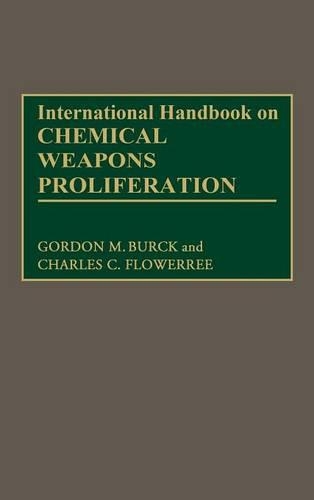
International Handbook on Chemical Weapons Proliferation
(Hardback)
Publishing Details
International Handbook on Chemical Weapons Proliferation
By (Author) Gordon M. Burck
By (author) Charles C. Flowerree
Bloomsbury Publishing PLC
Greenwood Press
30th August 1991
United States
Classifications
Tertiary Education
Non Fiction
355.82592
Physical Properties
Hardback
688
Width 156mm, Height 235mm
1134g
Description
The spread of "the poor man's nuclear weapon", as chemical weapons are termed, is given a detailed examination in this handbook. Gordon M. Burck and Charles C. Flowerree systematically sift though the literature on each of 39 countries outside Europe and North America suspected of having or seeking chemical warfare capabilities. In each instance, conclusions are drawn as to the credibility of the reports and the nature of the CW capability that each country possesses. A full chapter looks at the use of chemical weapons in the Iran-Iraq War, especially timely in light of Iraq's CW capability in the 1991 Persian Gulf war. Other sections provide background information on chemical weapons manufacturing, amounts needed for militarily significant capability, and the possibility of delivering CW agents by long-range delivery systems. The editors' analysis of past and current efforts to stem CW proliferation, including political measures, export contorls, and arms control negotiations, leads them to conclude that the only effective means of arresting chemical weapons proliferation would be a verifiable multi-lateral convention banning the possession and manufacture of chemical weapons.
Reviews
This is the most comprehensive and detailed study yet published on chemical weapons proliferation. It is liable to become a standard reference book for every student of non-conventional warfare and arms control.-International Affairs
"This is the most comprehensive and detailed study yet published on chemical weapons proliferation. It is liable to become a standard reference book for every student of non-conventional warfare and arms control."-International Affairs
Author Bio
GORDON M. BURCK is Senior Policy Analyst at EAI Corporation, Alexandria, Virginia. He has published Biological and Chemical Weapons in Brief, and, with Barbara Rosenberg, Verification of Compliance with the Biological Weapons Convention in Preventing a Biological Arms Race (1990). His chapter, Modernizing U.S. Chemical Warfare Capabilities: Effects on Deterrence and Arms Control appeared in Technologies for Security and Arms Control (1989). CHARLES C. FLOWERREE is a retired Foreign Service Officer whose last assignment was U.S. Ambassador to the Conference on Disarmament where he was the chief U.S. negotiator on a treaty aimed at banning chemical weapons. He is active with the Committee for National Security in Washington and was a consultant for the Federation of American Scientists while working on this book. He has written on arms control issues for the Los Angeles Times, Newsday, the Columbia University Journal of International Affairs, the Washington Quarterly and other professional publications. He has recently completed a teaching guide on multilateral negotiations for the Johns Hopkins School of International Studies.
